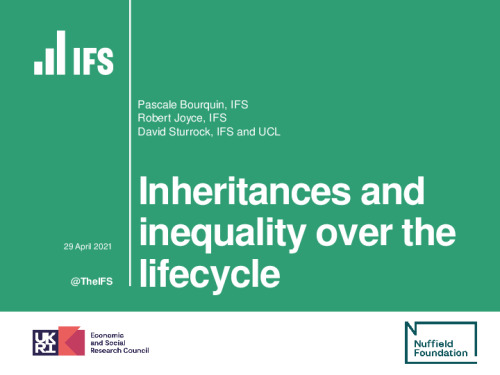Downloads

Download presentation slides
PDF | 272.15 KB
Rising levels of wealth held by older generations, alongside slow growth in the earnings of younger generations, means that inheritance looks set to be an increasingly important source of income for today's working-age generations. What will this mean for inequalities in living standards and wealth, and for social mobility? If people are expecting to inherit in the future, might that already affect their living standards and inequalities today?
In this event, IFS researchers shared the findings from a new report, funded by the Nuffield foundation, that makes projections of the inheritances to be received by those born in the 1960, 1970s and 1980s in the UK, and examines the implications for living standards and economic inequalities both now and in future.
You can watch the full video below.
Authors

Deputy Director
Robert is a Deputy Director. His work focuses on primarily on the labour market, income and wealth inequality, and the design of the welfare system.

Senior Research Economist
David’s research covers household wealth, intergenerational transfers, social mobility, pensions taxation, and health and work at older ages.
Presentation details
- Publisher
- IFS
Suggested citation
Joyce, R and Sturrock, D. (2021). 'Inheritances and inequality over the lifecycle: what will they mean for younger generations?' [Presentation]. London: IFS. Available at: https://ifs.org.uk/publications/inheritances-and-inequality-over-lifecycle-what-will-they-mean-younger-generations (accessed: 30 June 2024).
More from IFS
Understand this issue

Sure Start achieved its aims, then we threw it away
15 April 2024

Social mobility and wealth
12 December 2023

How important is the Bank of Mum and Dad?
15 December 2023
Policy analysis

How do the last five years measure up on levelling up?
19 June 2024

The two-child limit: poverty, incentives and cost
17 June 2024

Pensions: five key decisions for the next government
7 June 2024
Academic research

Income inequality in Ireland, 1987–2019
28 June 2024

Components of the evolution of income inequality in Sweden, 1990–2021
28 June 2024

The intergenerational elasticity of earnings: Exploring the mechanisms
3 June 2024